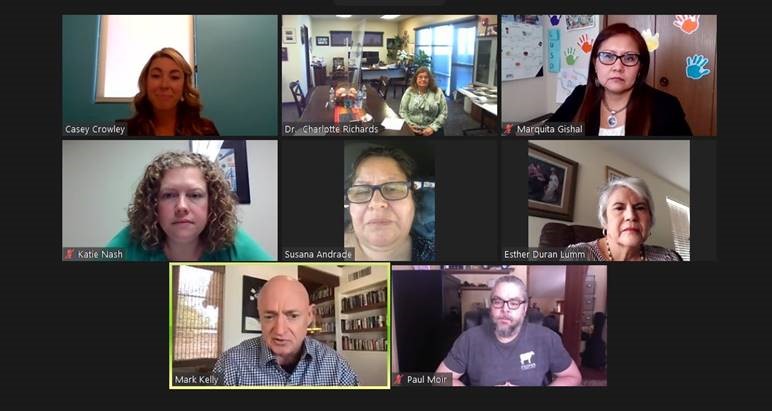ICYMI: Sen. Kelly Marks 100th Day in Office with Virtual Event with Arizonans
Teachers, essential workers, and other Arizonans share how COVID-19 relief bill will improve their lives
On his 100th day as a United States Senator, Mark Kelly held a virtual event alongside teachers, essential workers, small business owners, a restaurant owner, and Arizonans impacted by COVID-19 from across the state. They discussed how the pandemic and the economic fallout impacted them and their families. They also discussed the COVID-19 relief bill signed into law last Thursday, which will bring immediate help to Arizona families, health care workers, schools, seniors, and small businesses.

Watch the full conversation HERE
Kelly’s first meeting as a Senator was also held with Arizonans impacted by COVID-19, and in the intervening months, Kelly has spoken with 52 Arizona mayors, community leaders from all 15 counties, and met with members of his bipartisan advisory groups to take Arizonans’ concerns to Washington.
The participants included: Paul Moir, owner of three restaurants in Flagstaff; Susana Andrade, a cafeteria worker for the Phoenix Unified School District in Phoenix; Katie Nash, a high school biology teacher in Chandler; Marquita Gishal, a fourth grade teacher at Chinle Elementary in Navajo Nation; Casey Crowley, a registered nurse at Chiricahua Community Health Center in Douglas; Charlotte Richards, an OB/GYN specialist at Regional Center for Border Health in San Luis; and Esther Duran Lumm, an AFSCME retiree in Phoenix.
Here are some highlights from their conversation:
On COVID-19 Relief for Arizonans
Sen. Kelly [20:25]: Today I feel hopeful for Arizona and for our country. Yesterday, the President signed the American Rescue Plan into law. And here’s what this is going to do. It’s going to send $1,400 direct checks to most Arizonans, including children, it’s going to cut taxes for working families, extend those increased unemployment benefits, get our state additional funding for vaccine distribution, and help small businesses stay afloat, provide the funding schools need to open safely. It’s also going to make a historic investment in emergency funding for tribal nations, and deliver aid to local Arizona governments.
On Health Centers Receiving Additional Vaccine Doses, Funding
Casey Crowley [51:07]: We are very, very excited to be able to expand our services. This will allow us to hire more staff to be able to get the vaccines out to the community. We are spearheading a large outreach effort to agricultural workers which will mean we will actually go out to where they’re working and be able to get them the vaccines that they need and are requiring. So we’re grateful to have additional funding to be able to provide the services to our community.
On Food Insecurity in Arizona
Susana Andrade [36:16]: Working in one of the poorest districts in South Phoenix, we see the number of people grow every day — of getting lunch. We were serving in the beginning, we were just serving breakfast and lunch. And then they added dinner and a snack because there were so many people coming over.
It really hurts me every day. I see so many stories, so many kids that are hungry. So many families coming. It seems like the number gets bigger every day. I wish I could do more but I can’t. The only thing we can do is we take pride in what we do. We make the lunches presentable. We pack everything carefully. And we treat everybody with compassion and respect.
On COVID-19 Relief for Seniors
Esther Duran Lumm [1:04:19]: It is very trying. So I can tell you that when this [COVID-19 Relief] bill passed in the last few days it was so enlightening and such good news for all of us because even if we are fortunate enough to have a pension and retirement, it’s very trying and very traumatic to see other people suffering, and trying to make sure that people are being helped.
On COVID Relief Supporting Restaurants and Local Economies
Paul Moir [25:43]: I think everybody has realized during this just how broad an impact our industry has on sort of the greater economy of a town like Flagstaff, and across the nation. There’s so many industries that support our particular industry, from distributors to vendors to farmers, you know, all of it. And they have all been impacted when these restaurants closed down. So I think anything we can do to get money into these systems to get these businesses up and running, is going to carry throughout much more in the economy than just our industry alone.
On Funding to Tackle Educational Challenges on Navajo Nation
Marquita Gishal [45:08]: Most of our students, they want to go to school because in some cases [it is] safe for them. And they have their meals, they know they are going to eat something. It is very tough out here on the reservation being able to have the [resources] for our students and make sure they are well kept and try to be there for them.
Sen. Kelly [45:38]: The legislation that the President signed yesterday is a historic investment in tribal nations across the country. And some of the issues that you’re facing now, we should be able to go a long way to try to resolve them and get back on track, including the rural broadband issue and other infrastructure issues that the leadership on the Navajo Nation will have the resources to make investments in the future.
On COVID’s Highlighting Educational Inequalities
Katie Nash [27:55]: The challenges that we have been facing during COVID aren’t new, especially in Arizona. I think all of us are all too well aware of how poorly Arizona schools are funded. So it highlighted a lot of the inequities that are happening in our schools from district-to-district or site-to-site.
